Unit 10 I'd like some noodles Period 3 Section B (1a-1d)课件+嵌入音频(共15张PPT)
文档属性
| 名称 | Unit 10 I'd like some noodles Period 3 Section B (1a-1d)课件+嵌入音频(共15张PPT) | 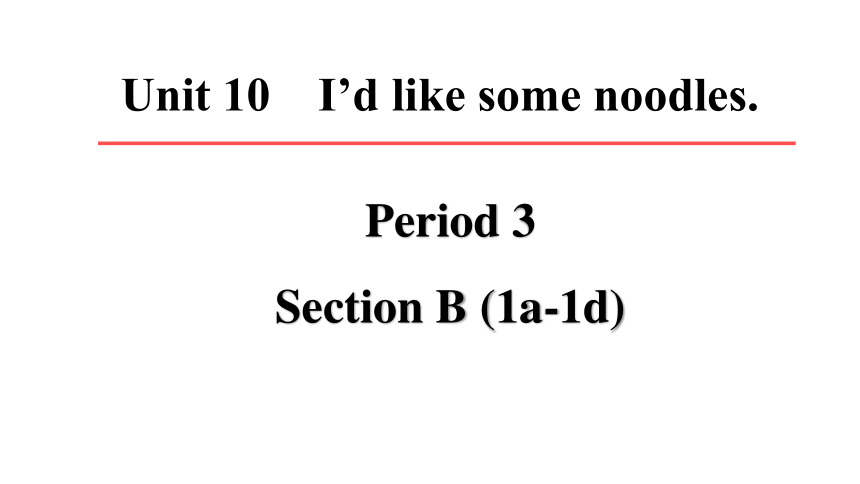 | |
| 格式 | pptx | ||
| 文件大小 | 18.4MB | ||
| 资源类型 | 教案 | ||
| 版本资源 | 人教新目标(Go for it)版 | ||
| 科目 | 英语 | ||
| 更新时间 | 2023-12-17 09:48:51 | ||
图片预览

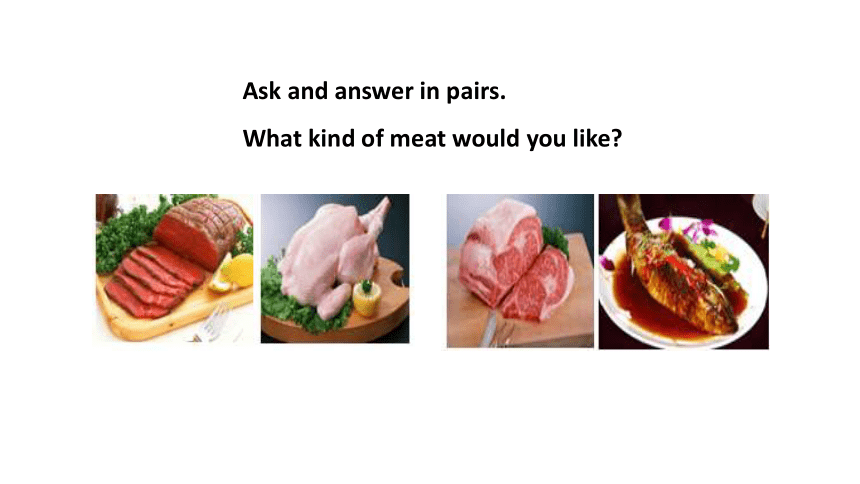
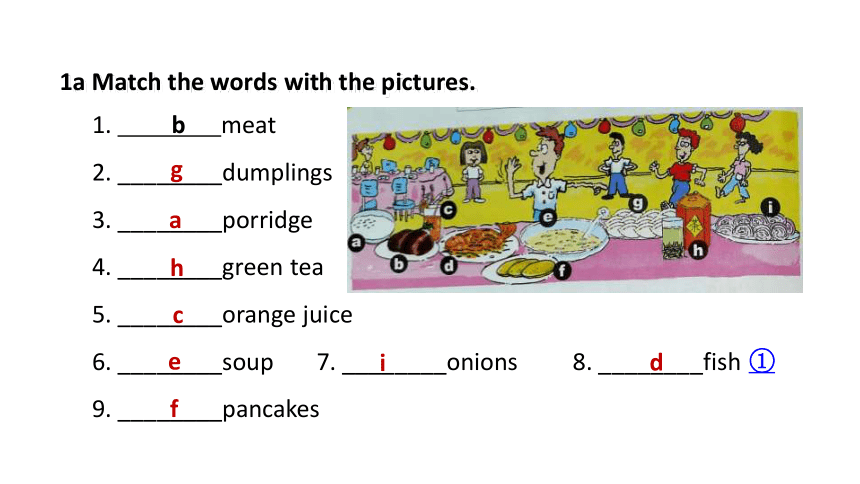
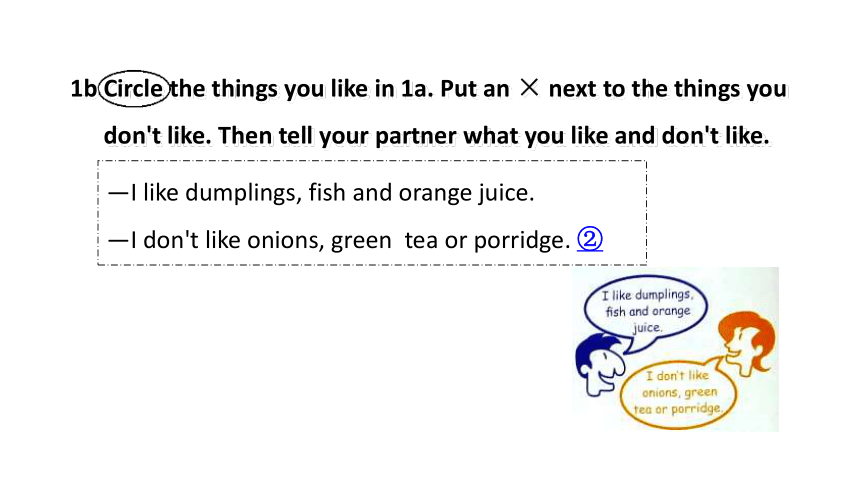
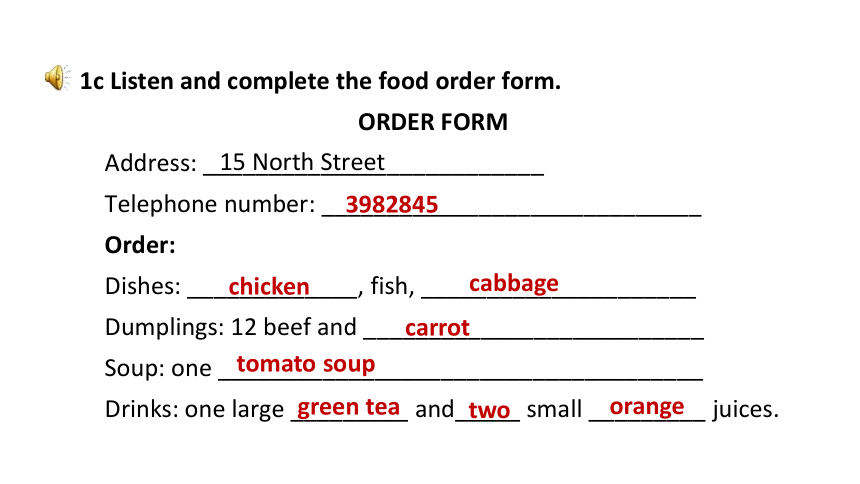
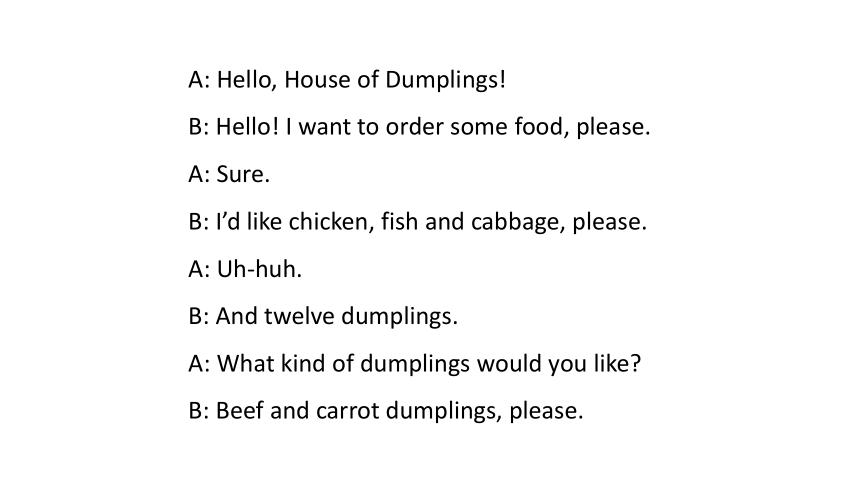
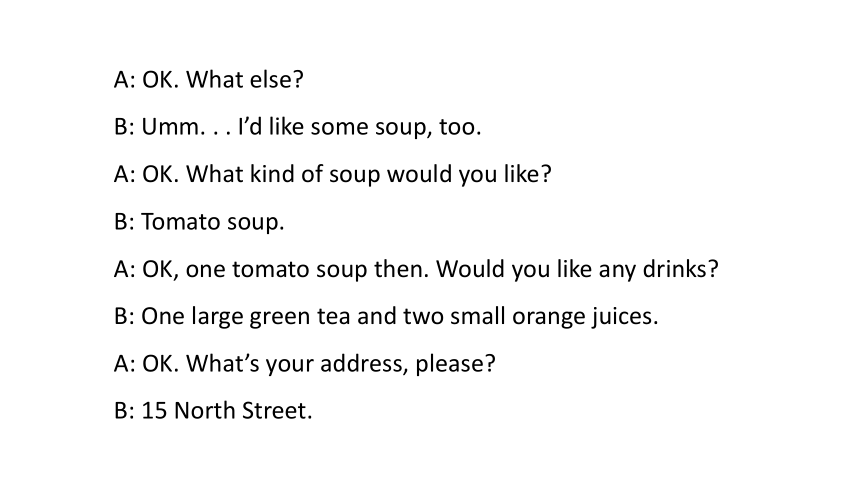
文档简介
(共15张PPT)
Period 3
Section B (1a-1d)
Unit 10 I’d like some noodles.
Ask and answer in pairs.
What kind of meat would you like
1a Match the words with the pictures.
1. b meat
2. ________dumplings
3. ________porridge
4. ________green tea
5. ________orange juice
6. ________soup 7. ________onions 8. ________fish ①
9. ________pancakes
g
a
h
c
e
i
d
f
1b Circle the things you like in 1a. Put an × next to the things you don't like. Then tell your partner what you like and don't like.
—I like dumplings, fish and orange juice.
—I don't like onions, green tea or porridge. ②
1c Listen and complete the food order form.
ORDER FORM
Address: __________________________
Telephone number: _____________________________
Order:
Dishes: _____________, fish, _____________________
Dumplings: 12 beef and __________________________
Soup: one _____________________________________
Drinks: one large _________ and_____ small _________ juices.
398 2845
chicken
cabbage
carrot
tomato soup
green tea
two
orange
15 North Street
A: Hello, House of Dumplings!
B: Hello! I want to order some food, please.
A: Sure.
B: I’d like chicken, fish and cabbage, please.
A: Uh-huh.
B: And twelve dumplings.
A: What kind of dumplings would you like
B: Beef and carrot dumplings, please.
A: OK. What else
B: Umm. . . I’d like some soup, too.
A: OK. What kind of soup would you like
B: Tomato soup.
A: OK, one tomato soup then. Would you like any drinks
B: One large green tea and two small orange juices.
A: OK. What’s your address, please
B: 15 North Street.
A: And what’s your telephone number
B: 398-2845.
A: 398-2845
B: Yup.
A: Thank you. That’ll be 65 yuan.
1d Listen again. Check your answers in 1c.
①fish
fish/f / n. 鱼; 鱼肉
考点1
作“鱼肉”讲时, 是不可数名词。
e. g. I had fish for dinner. 晚餐我吃了鱼肉。
考向1
作“鱼”讲时, 是可数名词, 复数有两种, 如果表示数量上的复数为 fish; 如果表示种类上的复数为fishes。
They caught several fish.
他们捉了几条鱼。
There are many fishes in the sea.
大海里有很多种鱼。
考向2
拓展: fish 还可用作动词, 意为“捕鱼; 钓鱼”。
e.g. He likes to fish on the weekend.
他喜欢在周末钓鱼。
返回
②I don’t like onions, green tea or porridge.
or / (r)/ conj. 或; 或者
考点2
or 在此处是并列连词, 用于否定句中, 在肯定句中用and。
e. g. I don’t like chicken or beef. 我不喜欢鸡肉和牛肉。
I like apples, pears and milk. 我喜欢苹果、梨和牛奶。
考向
特别提醒: 当句中有两个并列成分时, and/or 放在这两个成分中间;当句中有三个或三个以上并列成分时, and/or 只用在最后两个成分之间, 前面的用逗号隔开。
拓展:在否定句中, 如果连接的两个词前都有否定词时,则一般用and,而不用or 连接, 即no A and no B = no A or B。
e.g. That woman has no phone and no computer.
= That woman has no phone or computer.
= That woman doesn’t have phones or computers.
那个女人没有手机,也没有电脑。
考题: —Mary doesn’t like fish ______ chicken.
—Ben doesn’t like fish, ______ he likes chicken very much.
A. and; but B. or; but
C. or; and D. and; or
B
【点拨】第一空表示并列关系,且用于否定句中,用“or”。第二空表示转折关系,用“but”。
返回
Period 3
Section B (1a-1d)
Unit 10 I’d like some noodles.
Ask and answer in pairs.
What kind of meat would you like
1a Match the words with the pictures.
1. b meat
2. ________dumplings
3. ________porridge
4. ________green tea
5. ________orange juice
6. ________soup 7. ________onions 8. ________fish ①
9. ________pancakes
g
a
h
c
e
i
d
f
1b Circle the things you like in 1a. Put an × next to the things you don't like. Then tell your partner what you like and don't like.
—I like dumplings, fish and orange juice.
—I don't like onions, green tea or porridge. ②
1c Listen and complete the food order form.
ORDER FORM
Address: __________________________
Telephone number: _____________________________
Order:
Dishes: _____________, fish, _____________________
Dumplings: 12 beef and __________________________
Soup: one _____________________________________
Drinks: one large _________ and_____ small _________ juices.
398 2845
chicken
cabbage
carrot
tomato soup
green tea
two
orange
15 North Street
A: Hello, House of Dumplings!
B: Hello! I want to order some food, please.
A: Sure.
B: I’d like chicken, fish and cabbage, please.
A: Uh-huh.
B: And twelve dumplings.
A: What kind of dumplings would you like
B: Beef and carrot dumplings, please.
A: OK. What else
B: Umm. . . I’d like some soup, too.
A: OK. What kind of soup would you like
B: Tomato soup.
A: OK, one tomato soup then. Would you like any drinks
B: One large green tea and two small orange juices.
A: OK. What’s your address, please
B: 15 North Street.
A: And what’s your telephone number
B: 398-2845.
A: 398-2845
B: Yup.
A: Thank you. That’ll be 65 yuan.
1d Listen again. Check your answers in 1c.
①fish
fish/f / n. 鱼; 鱼肉
考点1
作“鱼肉”讲时, 是不可数名词。
e. g. I had fish for dinner. 晚餐我吃了鱼肉。
考向1
作“鱼”讲时, 是可数名词, 复数有两种, 如果表示数量上的复数为 fish; 如果表示种类上的复数为fishes。
They caught several fish.
他们捉了几条鱼。
There are many fishes in the sea.
大海里有很多种鱼。
考向2
拓展: fish 还可用作动词, 意为“捕鱼; 钓鱼”。
e.g. He likes to fish on the weekend.
他喜欢在周末钓鱼。
返回
②I don’t like onions, green tea or porridge.
or / (r)/ conj. 或; 或者
考点2
or 在此处是并列连词, 用于否定句中, 在肯定句中用and。
e. g. I don’t like chicken or beef. 我不喜欢鸡肉和牛肉。
I like apples, pears and milk. 我喜欢苹果、梨和牛奶。
考向
特别提醒: 当句中有两个并列成分时, and/or 放在这两个成分中间;当句中有三个或三个以上并列成分时, and/or 只用在最后两个成分之间, 前面的用逗号隔开。
拓展:在否定句中, 如果连接的两个词前都有否定词时,则一般用and,而不用or 连接, 即no A and no B = no A or B。
e.g. That woman has no phone and no computer.
= That woman has no phone or computer.
= That woman doesn’t have phones or computers.
那个女人没有手机,也没有电脑。
考题: —Mary doesn’t like fish ______ chicken.
—Ben doesn’t like fish, ______ he likes chicken very much.
A. and; but B. or; but
C. or; and D. and; or
B
【点拨】第一空表示并列关系,且用于否定句中,用“or”。第二空表示转折关系,用“but”。
返回
同课章节目录
- Unit 1 Can you play the guitar?
- Section A
- Section B
- Unit 2 What time do you go to school?
- Section A
- Section B
- Unit 3 How do you get to school?
- Section A
- Section B
- Unit 4 Don't eat in class.
- Section A
- Section B
- Unit 5 Why do you like pandas?
- Section A
- Section B
- Unit 6 I'm watching TV.
- Section A
- Section B
- Review of Units 1-6
- Unit 7 It's raining!
- Section A
- Section B
- Unit 8 Is there a post office near here?
- Section A
- Section B
- Unit 9 What does he look like?
- Section A
- Section B
- Unit 10 I'd like some noodles.
- Section A
- Section B
- Unit 11 How was your school trip?
- Section A
- Section B
- Unit 12 What did you do last weekend?
- Section A
- Section B
